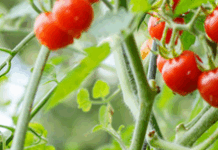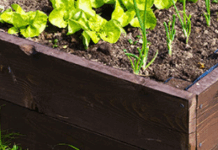If you’re pondering that question, here are some comments on fruit trees commonly grown in Kansas. Fruit trees are a long-term investment requiring careful thought before purchase. Begin by choosing fruit you will eat, not fruit that appears attractive in the catalog. Other considerations are outlined below. Space doesn’t allow for a complete list in this newsletter. For more choices, go to the publication “Small- and Tree-Fruit Cultivars” at http://www.ksre.ksu.edu/bookstore/pubs/MF1028.pdf You may also request this publication from your local K-State Research and Extension office.
Apples: Though we can grow a wide variety of apples in Kansas, pest-free fruit requires an extensive spray program. Apples are normally sprayed from March (dormant spray) until about two weeks before harvest. Sprays from April on throughout the growing season are applied at least every two weeks. As an alternative to many sprays, bagging can be used. See https://www.youtube.com/watch?v=sbbmgJ5F1wc for more information.
You need two different varieties of apples to produce fruit. Recommended varieties include Jonathan, Gala, Empire, Delicious, Golden Delicious, Jonagold, and Granny Smith. Recommended apples that are disease resistant include William’s Pride, Enterprise, Priscilla, and Redfree. Planting disease-resistant apples will reduce, but not eliminate, the need for pesticide applications. None of the apple varieties listed above are resistant to the summer apple diseases sooty blotch and flyspeck. It may be necessary to periodically apply a fungicide in the summer to suppress these fruit blemishing diseases. Also, all of the varieties listed will require protection from codling moth and other insect pests. The codling moth larva is the most common “worm” in the apple. Bagging will eliminate the need to spray for diseases and insects on the fruit once the fruit is bagged.
Cherries: Sweet cherries (such as Bing) are not well adapted to Kansas, but sour (pie) cherries are. Cherries are borne in June, so relatively few sprays are needed. Many years you may get by with no sprays at all. Only one tree variety is needed for fruit on sour cherries. Recommended sour cherries are Montmorency, Meteor, and North Star. The latter two are genetic dwarfs with Meteor reaching 10 to 14 feet and North Star growing to 8 to 10 feet.
Apricots: Apricot trees are quite ornamental, which is fortunate because late spring frosts usually eliminate fruit. On average, assume you will get fruit about once every 5 to 10 years. Portions of western Kansas may see fruit only once every 30 years. Almost all varieties of apricot are self-fruitful. Recommended varieties include Moorpark, Goldcot, Manchu, and Superb.
Peaches: Usually a relatively short-lived tree (10 to 12 years) that needs a great deal of pruning to keep productive. Peaches have the same problem with late frosts that apricots do but may not be quite as sensitive. Only one tree is needed for fruit. Try Intrepid, Contender, Redhaven, Harken, and Reliance. Intrepid blooms later than other peaches and blooms are much more frost resistant.
Pears: Pears are tough and are often one of the few trees that survive on an old homestead. Though trees should be sprayed, the chance of getting good fruit without spraying is much better than it is with apples. Usually, two trees are needed to get fruit. Proven pears include Seckel, Moonglow, and Duchess.
To learn how to control fruit pests see our publications page for fruit at https://hnr.k-state.edu/extension/horticulture-resource-center/publications/publications/food-crops/fruits-and-nuts.html Scroll down to “Spray Schedules.
Ward Upham, Extension Agent




